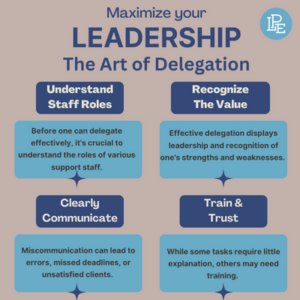Using Support Staff Appropriately: A Guide for New Attorneys on Effective Delegation

The transition from law school to the professional world can be jarring for many new attorneys. While legal education equips one with the knowledge of the law, the practical nuances of managing one’s work in a firm setting often require a different set of skills. One such skill is the art of delegation and appropriately using support staff. Harnessing this ability is essential for efficiency, client satisfaction, and overall firm productivity.
Understand the Role of Support Staff
Before one can delegate effectively, it’s crucial to understand the roles of various support staff:
- Paralegals: They are equipped to assist with legal research, drafting documents, and preparing materials for trial or other legal proceedings.
- Legal Assistants: Their tasks often involve administrative duties like scheduling, client communications, and file management.
- File Clerks: They manage and organize client files, ensuring that important documents are easily accessible.
- Receptionists: The front face of your firm, handling initial client interactions and directing calls.Recognize the Value of Delegation
Recognize the Value of Delegation
Delegating is not a sign of inability or incompetence. On the contrary, effective delegation displays leadership and recognition of one’s strengths and weaknesses. Delegating allows attorneys to:
- Prioritize critical tasks that require their expertise.
- Utilize the specialized skills of support staff.
- Enhance productivity by distributing tasks appropriately.
Clearly Communicate Tasks
Miscommunication can lead to errors, missed deadlines, or unsatisfied clients. When delegating:
- Be specific about what needs to be done.
- Set clear deadlines.
- Provide all necessary resources or information.
- Encourage questions to ensure clarity.
Train and Trust
While some tasks require little explanation, others may need training. Invest time in:
- Training your support staff on specific tasks or procedures.
- Providing constructive feedback.
- Building trust and rapport. Trust your team to handle their responsibilities, but also be available for guidance.
- Schedule quick daily meetings. This gives your staff the opportunity to ask questions without disrupting your work with multiple interruptions throughout the day.
Respect Their Time and Expertise
Support staff, just like attorneys, have their own set of tasks and deadlines. Before delegating:
- Check in with their current workload.
- Understand their areas of expertise and use them to the firm’s advantage.
- Respect their boundaries and off-work hours.
Foster an Open Feedback Environment
Encourage an environment where support staff feels comfortable providing feedback. They are often the ones who recognize procedural inefficiencies or have insights into improving workflows.
Avoid Micromanaging
Once you’ve delegated a task, avoid the temptation to oversee every little detail. Micromanaging can:
- Reduce morale and the confidence of support staff.
- Take away time you could be using to focus on other tasks.
- Impede the professional growth of your team.
Recognize and Appreciate
Everyone thrives on appreciation. Regularly recognizing the hard work and contributions of your support staff can:
- Boost morale.
- Encourage loyalty and dedication.
- Foster a positive and collaborative work environment.
Conclusion
The ability to effectively delegate and use support staff appropriately is an essential skill for new attorneys. It’s not only about reducing one’s own workload but about ensuring that every task is undertaken by the person most suited for it. With mutual respect, clear communication, and trust, attorneys and their support staff can ensure a harmonious and efficient work environment, delivering the best results for their clients.








